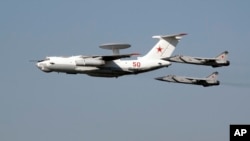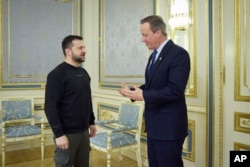The British Defense Ministry said Friday that Russia has “likely” using an updated surveillance aircraft due to concerns that Ukraine could deploy combat aircraft provided by the West.
The ministry, in its daily update on the Russian invasion of Ukraine, said that Russia is “likely” using the A-50 MAINSTAY D. The report said the newest version of the Mainstay, which was first developed in the 1980s, is able to spot adversary aircraft at longer ranges than previous models.
Meanwhile, Ukrainian President Volodymyr Zelensky in his daily address Thursday that “Russia has lost hope of keeping the Black Sea for itself as a springboard for aggression against other nations.”
Zelensky added, “We will do everything to enhance this result.”
Meanwhile, more than 2,400 Ukrainian children have been taken to Belarus since Russia invaded Ukraine in 2022, according to new research published Thursday by Yale University.
The findings by the Humanitarian Research Lab at the Yale School of Public Health are the most extensive yet about Belarus’ alleged role in Russia’s forced relocation of Ukrainian children.
The report found that Ukrainian children, ages 6 to 17, had been transported from at least 17 cities in Ukraine’s Russian-occupied territory.
Yale identified more than 2,000 children who were transported to the Dubrava children’s center in the Minsk region of Belarus between September 2022 and May 2023. More than 390 children were taken to another 12 facilities, the report said.
That’s on top of the nearly 20,000 Ukrainian children who were forcibly taken from Ukraine to Russia since the war began, according to Kateryna Rashevska, a legal expert at the Regional Center for Human Rights in Kyiv.
Ukraine’s war crimes prosecutors are investigating the forced transfer of Ukrainian children as potential genocide.
Russian shelling across southern Ukraine's Kherson region on Thursday killed two people and wounded at least 12, local officials said.
Among the victims was a 75-year-old woman who died in her apartment in the region’s biggest town, which is also called Kherson, regional governor Oleksandr Prokudin said on the messaging app Telegram.
Also on Thursday, the United Kingdom’s top foreign diplomat, David Cameron, traveled to Ukraine’s Port of Odesa to pledge continued support for the Ukrainian war effort.
Cameron’s visit is the first the former British prime minister has made since being named to his new role of foreign minister.
It also marks the first time a British diplomat has traveled to the port city, a frequent target of Russian airstrikes during the war in Ukraine.
Cameron said the U.K. would continue to provide whatever support was needed to Ukraine, "but above all, the military support that you need not just this year and next year but however long it takes."
The visit came as Ukraine has faced significant setbacks in the war effort, including attention shifting to the Israel-Hamas war in the Middle East, the European Union’s inability to provide all the munitions it promised, and political fighting in the United States threatening additional aid to Ukraine.
The U.K. said its $5.7 billion of military aid to Ukraine was second only to the U.S. and that the country had trained 30,000 Ukrainian troops.
"Russia thinks it can wait this war out and that the West will eventually turn its attention elsewhere," Cameron said in a statement Thursday. "This could not be further from the truth. In my first discussions with President [Volodymyr] Zelenskyy in my new role, I made clear that the U.K. and our partners will support Ukraine and its people for as long as it takes for them to achieve victory."
The Ukrainian counteroffensive has seen little success, and the war appears to be reaching a stalemate, a situation that Zelenskyy has warned would create a "volcano that is sleeping but will definitely wake up."
"We cannot afford any stalemate," Zelenskyy told African journalists in Kyiv on Wednesday. "If we want to end the war, we must end it. End with respect so that the whole world knows that whoever came, captured and killed, is responsible."
According to the Ukrainian president, if the war becomes a stalemate, future generations of Ukrainians will have to fight, because Russia "will come again if it is not put in its place."
Zelenskyy’s comments came two weeks after General Valery Zaluzhny, commander in chief of the Ukrainian military, told The Economist that the war had "reached the level of technology that puts us into a stalemate."
Zelenskyy acknowledged that the situation on the battlefield remained very difficult but said he does not believe that the war has reached a stalemate. He emphasized that Ukraine will not negotiate with Russia until it completely withdraws from Ukrainian territory.
Some information in this report came from The Associated Press and Reuters.







